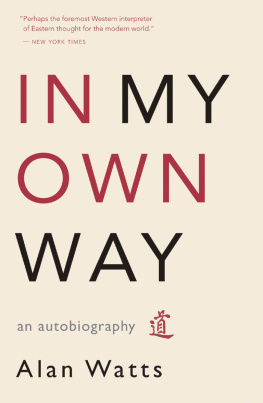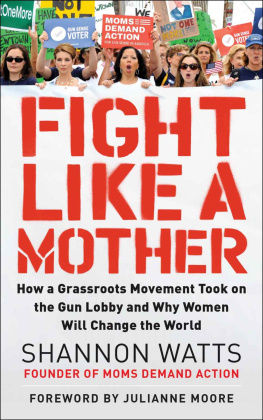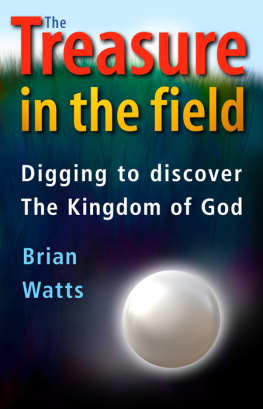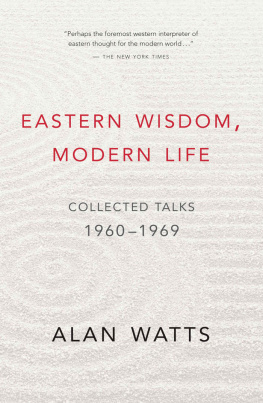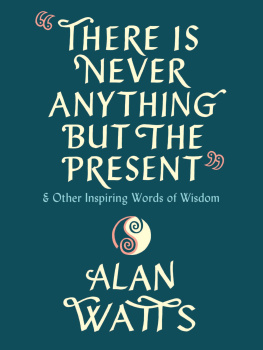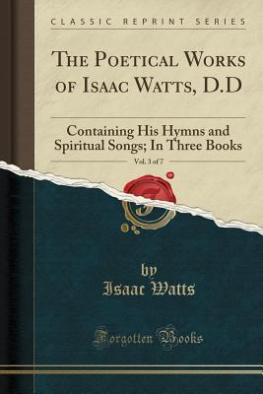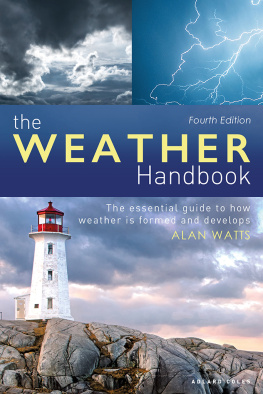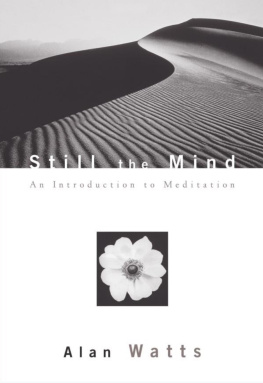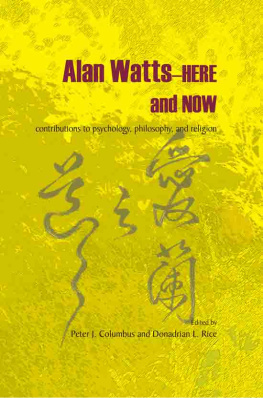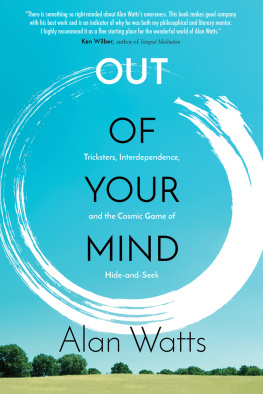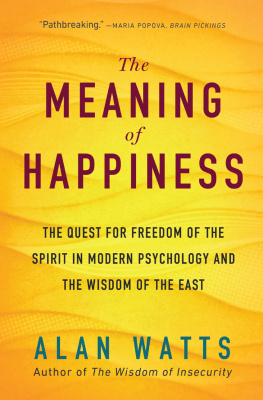Watts - In My Own Way: an Autobiography
Here you can read online Watts - In My Own Way: an Autobiography full text of the book (entire story) in english for free. Download pdf and epub, get meaning, cover and reviews about this ebook. City: Novato, year: 2007, publisher: New World Library, genre: Art. Description of the work, (preface) as well as reviews are available. Best literature library LitArk.com created for fans of good reading and offers a wide selection of genres:
Romance novel
Science fiction
Adventure
Detective
Science
History
Home and family
Prose
Art
Politics
Computer
Non-fiction
Religion
Business
Children
Humor
Choose a favorite category and find really read worthwhile books. Enjoy immersion in the world of imagination, feel the emotions of the characters or learn something new for yourself, make an fascinating discovery.
In My Own Way: an Autobiography: summary, description and annotation
We offer to read an annotation, description, summary or preface (depends on what the author of the book "In My Own Way: an Autobiography" wrote himself). If you haven't found the necessary information about the book — write in the comments, we will try to find it.
Watts: author's other books
Who wrote In My Own Way: an Autobiography? Find out the surname, the name of the author of the book and a list of all author's works by series.
In My Own Way: an Autobiography — read online for free the complete book (whole text) full work
Below is the text of the book, divided by pages. System saving the place of the last page read, allows you to conveniently read the book "In My Own Way: an Autobiography" online for free, without having to search again every time where you left off. Put a bookmark, and you can go to the page where you finished reading at any time.
Font size:
Interval:
Bookmark:
OWN
WAY
Beyond Theology
The Book
Cloud-hidden, Whereabouts Unknown
Does It Matter?
The Joyous Cosmology
Myth and Ritual in Christianity
Nature, Man and Woman
Psychotherapy East and West
The Spirit of Zen
The Supreme Identity
Tao
This Is It
The Way of Zen
The Wisdom of Insecurity
Still the Mind
What Is Tao?
What Is Zen?
OWN
WAY

Alan Watts


Copyright 1972 by Alan Watts
Originally published by Pantheon Books, 1972; Vintage Books edition, 1973
All rights reserved. This book may not be reproduced in whole or in part, stored in a retrieval system, or transmitted in any form or by any meanselectronic, mechanical, or otherwithout written permission from the publisher, except by a reviewer, who may quote brief passages in a review.
Grateful acknowledgment is made to the following:
James Broughton and The Jargon Society, for permission to use excerpts from A Long Undressing: Collected Poems 19491969. Copyright 1971 by James Broughton.
Elsa Gidlow, for permission to use Let the Wild Swan Singing Go; and for an excerpt from Forgive Us, from Moods of Eros (Druid Heights Press).
Text design and typography by Tona Pearce Myers
Library of Congress Cataloging-in-Publication Data
Watts, Alan, 19151973.
In my own way : an autobiography, 19151965 / Alan Watts. 2nd ed.
p. cm.
Includes index.
ISBN-13: 978-1-57731-584-1 (pbk. : alk. paper)
ISBN-10: 1-57731-584-7 (pbk. : alk. paper)
1. Watts, Alan, 19151973. 2. Zen BuddhistsUnited StatesBiography. 3. PhilosophersUnited StatesBiography. 4. Zen BuddhistsEnglandBiography. 5. PhilosophersEnglandBiography. I. Title.
BQ995.T8A3 2007
294.3927092dc22 2007006128
First New World Library printing, June 2007
ISBN-10: 1-57731-584-7
ISBN-13: 978-1-57731-584-1
Printed in Canada on acid-free, partially recycled paper

10 9 8 7 6 5 4 3 2 1
A foreword written by a father to his sons autobiography may not be unique but it must surely be something of a rarity; indeed the only somewhat similar instance I can recall is that of Rudyard Kiplings Kim, beautifully illustrated by his father, Lockwood Kipling.
What may appear to be another rather odd circumstance is that a person of Alans breadth of outlook and depth of thought should have sprung from the parentage of a father who inherited much of the Victorian outlook and tradition and a mother whose family were Fundamentalists to whom the Bible was the Truth, the whole Truth, and nothing but the Truth. And that without any upheaval of the relations between us.
Perhaps this circumstance may qualify me in some way to write this foreword, for I still do not go the whole way with him in some of his views, and it thus enables me to restrain the natural parental pride and admiration which I have for his work from becoming mere adulation.
As a child a gift of narrative showed in him before he could read or write, and an early need was to keep him supplied with material for illustrating tales he invented about an imaginary island and its people situatedappropriately in view of his later interest in the Eastin the Pacific Ocean. Plenty of white kitchen paper, pencils, and colored chalks had always to be on hand.
He acquired quite early a characteristic handwriting, and when I went with him to open his first Post Office Savings Bank account, I had some difficulty in convincing the clerk that Alan had himself written the signature on the pass-book. The clerk said he had never seen so mature a signature by a child of that age.
It was while he was at Kings School at Canterbury that his thoughts turned to the East and he became interested in Buddhism. He made the acquaintance there of one who had traveled in Japan and the Far East and who introduced him to the works of Lafcadio Hearn. He also corresponded with the Buddhist Lodgeas it was thenand when we attended one of its meetings, to which Alan had asked me to go with him, I remember the astonishment when a lad of sixteen introduced himself as their correspondent.
Incidentally, he wrote and published his first book while still at school.
Another episode of his school days is worth recording as a tribute to the broadmindedness of his Headmaster, Norman Birley. When Archbishop Tempe of York arranged a Convention on Religion in the Public Schools, Mr. Birley suggested to Alan that he should attend as one of the schools representatives, a liberal gesture from a school so closely connected with the Church of England.
It was at this time, during the school holidays and immediately after he left school, that probably the most interesting period developed in the relations between the three of us, mother, father, and son. The house in which we lived had a large room running from front to back which we used for meetings and discussion groups on the various subjects in which Alan was interested. He had now acquired a typewriter and often after an evening spent in composition he would come down and ask us to hear and discuss something he had written. Discussion continued sometimes until late in the night.
I have of course read with great enjoyment all his books and any of his articles which have come my way, and have learned much from them. Visits to the United States have also enabled me to attend his lectures and seminars and to take part in the discussions following upon them, and it is here, I think, that Alan excels. The lucidity with which he speaksand writesof matters which are enormously difficult to express in words is amazing. The discussions are to my mind models of what a discussion should be, not an antagonistic debate but an exchange of views in which each side learns something from the other, and here Alan shows the way by his courtesy and open-mindedness. Questions intended seriously are answered seriously, and no questioner is ever made to look or feel foolish. I have no doubt that such consideration, especially when it is extended to the youthful inquirer, accounts largely for the interest taken in his philosophy by the young people of America.
Finally he has done more perhaps than any other writer to open the eyes of the West to the spiritual significance of Eastern religions and philosophies and to show that the Truth is not the monopoly of any one school of religious or philosophic thought.
Perhaps I may analogize this by supposing that four men approach an inaccessible mountain from different directions, and each writes a faithful description of the mountain as he sees it. Inevitably they will differ widely in detail and in opinion as to the best way to reach the summit, and although each account will be true as far as it goes, none will give a true picture of the mountain as a whole. But by putting the four accounts together, each taking from the others what it lacks, surely a much closer approximation to the whole will be achieved.
The Paths are many but their End is One.
Font size:
Interval:
Bookmark:
Similar books «In My Own Way: an Autobiography»
Look at similar books to In My Own Way: an Autobiography. We have selected literature similar in name and meaning in the hope of providing readers with more options to find new, interesting, not yet read works.
Discussion, reviews of the book In My Own Way: an Autobiography and just readers' own opinions. Leave your comments, write what you think about the work, its meaning or the main characters. Specify what exactly you liked and what you didn't like, and why you think so.

